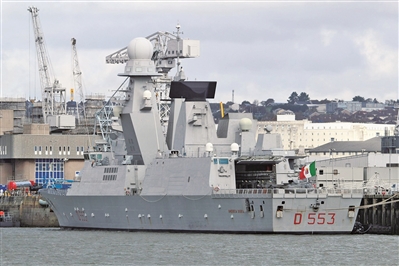
By Dong Yue and Ge Hongshun
The Coordinated Annual Review on Defense Report recently released by European Defence Agency found that while EU members are eager to increase their defense budget and invest more in their national defense projects, their interests in funding defense cooperation projects within the union haven’t grown, and these cooperation projects haven’t shown any notable progress either. This falls far short of what some analysts anticipated earlier, who used to reckon that the regional conflict would largely boost the members’ willingness to strengthen defense cooperation.
In fact, the members are only willing to invest in EU’s defense cooperation projects when they consist with their own defense projects and interests – for instance – by either benefiting their military industry or tightening strategic partnerships. At the same time, as most EU members are also NATO members, they tend to view NATO rather than the EU as the main agency of multinational defense cooperation, which has more or less impeded defense cooperation within the EU.
Other factors may have also played a part.
On the one hand, most of the EU’s defense cooperation projects are time-consuming, whereas right now the members mainly spend their defense budget on buying ready-for-use weapons and equipment. After the regional conflict broke out, EU members chose to quickly beef up their military capacities by purchasing large amounts of weapons and equipment – preferably with quick delivery. Meanwhile, most of the cooperation projects are still in the development stage. For instance, the Future Combat Air System (FCAS) and the new type of main battle tank (MBT) are still being designed and developed, and it is a long way from making the prototype to conducting tests and to launching for use. That doesn’t sound very attractive for the EU members eager to enhance their military capacities quickly. Thirdly, defense cooperation among EU members has always been bumpy in history due to different needs. When Eurofighter Typhoon was being developed, for example, France backed out because it had a different need, and went on to develop its own Rafale. Britain also backed out of the Horizon-class Destroyer project due to divergences with France and Italy.
On the other hand, America’s position in NATO and its technological superiority in weapon and equipment R&D has to some extent undermined the defense cooperation among EU members. As mentioned earlier, most EU members are also NATO members, and some of them have bilateral or multilateral military relations with the US for the latter’s strong clout and control in NATO. This, combined with America’s superiority in military technologies, has inclined some EU members towards the US for defense cooperation.
But the EU does have two programs now that are appealing to its members. One is jointly building a permanent standby force by all members and holding regular military exercises, and the other is formulating an EU standard military training program to train armed forces for partners.
On an objective note, both programs will have limited effects on promoting defense cooperation within the EU. For one thing, they are focused on establishment and mechanisms such as forming troops and formulating the standard training program, which is more performative than pragmatic and will take a long time to make any real difference. For another, the EU hasn’t rolled out any details to back up its cooperation projects. Although the report has pointed out some problems with the union’s defense cooperation, it fails to provide any constructive solution. What’s more, the problems, being related to the EU’s nature as a bloc, the members’ different interests, and the union’s institution, mechanisms, and history, cannot be solved through a simple report either.
After the conflict broke out, EU members are under a lot of pressure in terms of energy, economy and livelihood, and the mounting defense budget has become a heavy burden for some of them. Therefore, they are willing to spend the budget on projects they are surer of, and the willingness to increase investment in the EU’s defense cooperation projects is something that requires observation over a longer term.













